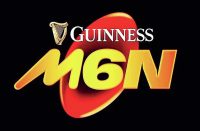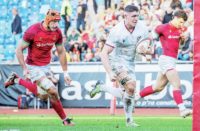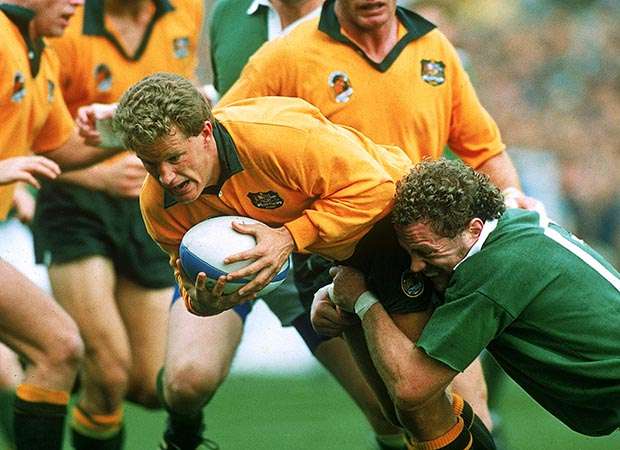 Michael Patrick, Thomas Lynagh – yes there are some Irish antecedents there for sure – doesn’t really ‘do’ drama. As a player he was unruffled, unhurried and consummate while as a pundit and indeed member of the human race he is exactly the same. Despite a stellar career he was exceptional in his normality, his life seemingly devoid of the massive highs and lows that seem to affect most other mortals.
Michael Patrick, Thomas Lynagh – yes there are some Irish antecedents there for sure – doesn’t really ‘do’ drama. As a player he was unruffled, unhurried and consummate while as a pundit and indeed member of the human race he is exactly the same. Despite a stellar career he was exceptional in his normality, his life seemingly devoid of the massive highs and lows that seem to affect most other mortals.
That of course was almost certainly an illusion. Nobody gets to the top in sport without a good deal of blood, sweat and tears somewhere along the way and not that you would have ever guessed at the time but Lynagh was badly affected by the financial crisis of 2008, being made redundant and having to start his business career afresh with a young family to support.
To the outside world though Lynagh did appear to sail effortlessly through life until that fateful day – April 18, 2012 – when a coughing fit triggered by his friend Peter Hancock’s outrageous joke at a catch-up of old mates at Friday’s Bar in Brisbane.
First he thought that his beer had gone down the wrong way as he coughed violently, then came the immediate onset of a headache, dizziness and a strange form of visual disturbance which escalated alarmingly as he was rushed to the Royal Brisbane Hospital.
Lynagh was then a fit 48-year-old who kept in trim down the gym, by playing golf and disappearing on the occasional surfing safari to Indonesia and the Maldives where he would rip waves with the panache of his schoolboy hero and world surfing champion Wayne ‘Rabbit’ Bartholomew. But regardless of that he was experiencing a full-scale stroke. In fact to be precise he was suffering from a life-threatening vertebral artery dissection which resulted in a fist-sized blood clot forming in his skull and for a while was very ill indeed. Family and friends feared the worse.
When his father Ian, trained in sports medicine, rushed to the hospital and through a glass partition observed a doctor reviewing a brain scan he commented to his wife Marie: “Jeez, that poor guy ‘s in a bit of trouble.” Only later came the realisation that it was his son’s scan they were looking at.
Displaying that understated Aussie grit that underpinned his entire rugby career Lynagh fought it all the way. The only side affect you would notice now – and you would have to look very closely indeed to spot it – is reduced eyesight looking to the left, what the medics call a ‘left hemianopia’ – which is when your vision looking left is compromised in both eyes.
The rugby world was stunned by news of Lynagh’s illness and not just because the amiable Australian has left friends wherever he played or pitched his tent. No, it struck a bit deeper than that. Above averagely fit, scarcely middle-aged sporting legends are not meant to get strokes. If Michael Lynagh could be struck down the rest of us had better look out and start being more vigilant about our health.
Lynagh discusses all of the above, and much more, in his biography Blindsided – co-written with Mark Eglinton – which is published this month. Given both the rugby content from a record-breaking career of high achievement – Aussie Schools, ’84 Grand Slam tour of Europe, three World Cups for starters – and the very human dimension of battling and overcoming serious, unexpected illness it ticks all the boxes and is a terrific read.
There is even a large dollop of romance with Lynagh meeting his Italian wife-to-be Isabella on the very day he was leaving Treviso as a successful spell with the Italian team seemingly came to a close. There followed an old-fashioned long distance courtship by letter – this is pre email, text and twitter – before he decided that he would simply have to return to Italy for another season.
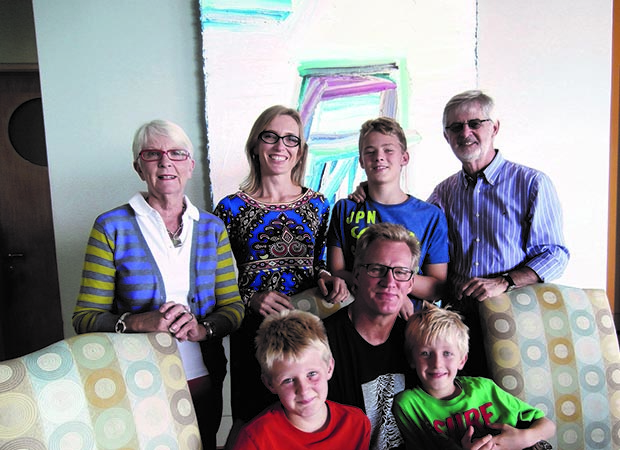 When I spoke to Lynagh recently he was both reflective and jubilant. A brush with death – and make no mistake at one stage in that Brisbane hospital it could have gone either way – always encourages the former but he was also in high spirits having that very day been re-issued with his driving licence, a massive milestone in his recovery. There is now nothing of any importance that he can’t do following his stroke that he did before falling ill.
When I spoke to Lynagh recently he was both reflective and jubilant. A brush with death – and make no mistake at one stage in that Brisbane hospital it could have gone either way – always encourages the former but he was also in high spirits having that very day been re-issued with his driving licence, a massive milestone in his recovery. There is now nothing of any importance that he can’t do following his stroke that he did before falling ill.
It’s been extraordinary journey but has it changed him in any significant way, has it changed his perspective on life? Many who have survived close brushes with death are energised and “celebrate” by heading off into different directions, pursuing dreams they had long ago abandoned while some undergo radical personality changes and find it all rather difficult, or become a tad philosophical and moody.
“I wish I had something profound to say on that subject,” laments Lynagh. “But the truth is that other than the journey to actually overcome the stroke, and my huge thanks and gratitude to everybody who helped me, it hasn’t particularly changed my attitude to life and, hopefully, I am still basically the same person.
“Look, I was an incredibly lucky and blessed individual before the stroke and even then I like to think I never took anything for granted. My wife and family were my life, I lead a healthy lifestyle and I enjoyed strong friendships from both my sporting and ‘normal’ life. I played my golf, surfed when I could, worked hard to pay the bills and school fees and was thoroughly enjoying my punditry for Sky. Everything in my garden was pretty rosy. And then from nowhere, completely randomly, the stroke hit me and I had to deal with that.
“The support from friends and the rugby community in general has been fantastic but to be honest I’ve always found friendship and support from this game. It’s one of the things that makes it so special.
“Being a former sportsman helped a little in the recovery process I suspect. We are used to setting ourselves targets, monitoring progress no matter how small and sticking to the plan. You get used to trusting the experts and the medics and understanding – and believing – that if you put the work in you will get an end result. All of that came into play no question.
“It was slow progress sometimes, though, and I had to stay patient. First there were little victories like walking to the bathroom unaided from my hospital bed, then walking a bit further without losing my balance.
“The biggest permanent affect has been reduced vision looking left but the body is a wonderful thing and learns how to compensate. I soon realised that I could still read a newspaper and watch the TV. Later on I got back onto a golf course and for sure I’m not quite the player I was but that could be down to old age and stiffening joints anyway.
“For a while I would be very clumsy with my altered vision and I would be knocking over bottles and glasses of water as I waved my arms around. Sean Fitzpatrick learned not to sit too close to me in the Sky studios after I knocked one unseen glass of water over his freshly pressed suit.
“Having recovered well I consider it very important to try and get that message out there whenever I have the opportunity which is one of the reasons I have done the book now. We need more awareness about strokes and how you can recover and also we need to dispel this myth that it is an illness exclusively connected with old age. It can hit anybody at any time and during my recovery I met many individuals much younger than me.”
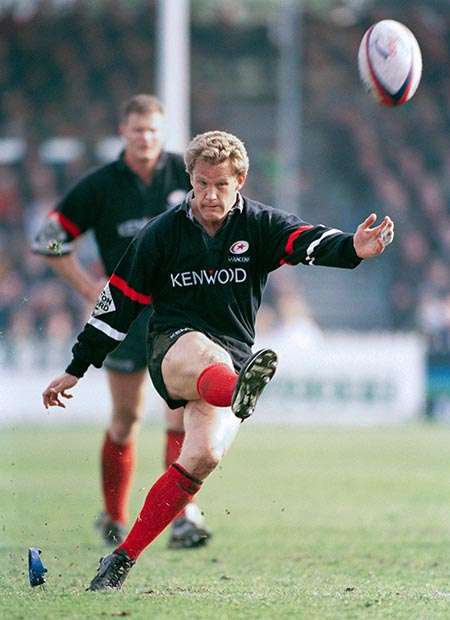 Lynagh comes from that generation whose career was basically played out in the amateur era but experienced a tantalising glimpse of the ‘promised land’ of professionalism right at the end of his career. He was Nigel Wray’s first high-profile overseas signing at Saracens where he enjoyed an Indian summer to his career alongside fellow galacticos – Francois Pienaar and Philippe Sella. That short but happy chapter of his life culminated in a glorious 48-18 thumping of Wasps in the 1998 Tetley’s Bitter Cup final, one of the defining performances in modern day English club rugby.
Lynagh comes from that generation whose career was basically played out in the amateur era but experienced a tantalising glimpse of the ‘promised land’ of professionalism right at the end of his career. He was Nigel Wray’s first high-profile overseas signing at Saracens where he enjoyed an Indian summer to his career alongside fellow galacticos – Francois Pienaar and Philippe Sella. That short but happy chapter of his life culminated in a glorious 48-18 thumping of Wasps in the 1998 Tetley’s Bitter Cup final, one of the defining performances in modern day English club rugby.
“Looking back I had a foot in both camps – amateurism and professionalism – and I’m very happy about that. Would I have liked to play in an era when a club like Toulon offered me £750,000 a year to play for a couple of seasons? Well, yes, I won’t deny that would have its attractions, but I also know enough about life to assure you that money isn’t everything. Far from it.
“I’m thankful I grew up as an amateur, went to university and worked as well as played rugby. It gave me a life experience that helped after retirement and a group of friends away from the elite game who keep it all real. It prepares you for the majority of your life which comes after you stop playing.
“There was a real sense of being pioneers and pushing back the frontiers for my generation as the game started to expand and inch its way towards professionalism. I enjoyed the massive adventure of just upping sticks after the 1991 World Cup and playing for Treviso for a couple of years, a move which eventually led to me meeting my future wife.
“And I enjoyed the sheer excitement and sense of the unknown of again setting off in a different direction at the end of my career and becoming the first overseas professional signing with Saracens.
“I had just got married and we flew in from New York and set up home in an empty flat somewhere in North London with no idea whether professional rugby was going to work or not. Nobody did. Right at the start there was even this notion that because we were going to be professional we had to somehow clock on at the club at 9am and not clock off until 5pm. We just weren’t sure what it all involved but I did sense it was a pivotal moment.
“I vividly remember on the day of the media launch I met up with Nigel Wray at his office in central London and as we walked over the road to the Cafe Rouge where it was going to be held I said, ‘do you realise one way or another our lives will never be the same’.
“And that was definitely true. Nigel went from being a rugby fanatic and supporter who operated under the radar behind the scenes with very little profile to very quickly becoming the front man for this new phenomenon called professional rugby.
“As for me I started a career path which still sees me based in London nearly 20 years later, living in Richmond with our three wonderful sons which I would never have predicted back then. You never really know what’s going to happen next.”
Isn’t that just the truth?


